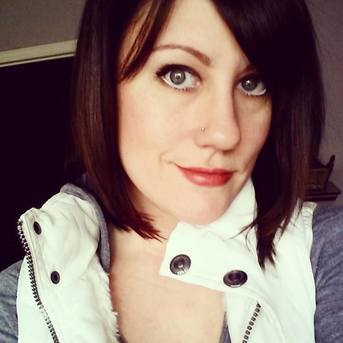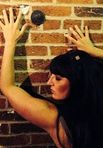Carpe Noctem Chapbook Interview With Leigh Anne Hornfeldt
 Winged City Chapbooks, 2016 THINGS WE’RE DYING TO KNOW…
Winged City Chapbooks, 2016 THINGS WE’RE DYING TO KNOW…Let’s start with the book’s title and your cover image. How did you choose each? And, if I asked you to describe or sum up your book, what three words immediately come to mind?
The title popped into my mind one day as I was trying to describe the latest project I was working on to someone. I kept using the word fleshed when talking about the poems: I wanted to flesh them out from something internalized to something almost tangible. While in the middle of talking it hit me that was the perfect title for a book that deals with themes of mental illness and how that manifests in our actions and our flesh. Some of the poems have a dark humor, some are weird. I felt like the image of the skeleton bride was fitting in that it plays with the idea of being naked, without flesh. It all just ties in nicely, at least in my mind! I’d say this book has a sense a vulnerability, a sense of humor, and a sense of urgency.
What were you trying to achieve with your chapbook? Tell us about the world you were trying to create, and who lives in it.
A lot of these poems were born out of a daily writing challenge I was part of. As I wrote I started to see themes manifest, especially the idea of mania versus depression that I experience. A lot of this book also deals with the ways in which we change over time, mentally and physically. I wanted this book to play upon the tensions of those differences.
Can you describe your writing practice or process for this collection? Do you have a favorite revision strategy?
I like to begin by handwriting a quick draft, kind of like a runner might stretch before going for a run. After I have the basic idea, I let it brew for the morning. I generally sit down at my laptop in the afternoon and write the real poem. I let that rest and then revise after a few days have passed. It’s pretty methodical but also I think I need that break time so that surprises can still happen. Sometimes a line will pop into my head or I will see something that has to go into one of my poems. They need room to breathe and become their own thing.
How did you order the poems in the collection? Do you have a specific method for arranging your poems or is it sort of haphazard, like you lay the pages out on the floor and see what order you pick them back up in?
I am a floor organizer! Usually I can pick the first and last poem pretty easily. Then I take to the floor and try to see which poems speak to one another. Sometimes it’s just an image or a single word, but once I see the relationships between the poems it feels natural.
What do you love to find in a poem you read, or love to craft into a poem you’re writing?
Like I said before, surprise. Sometimes I wish I could be more spontaneous when writing. I admire poets who are able to relax and let what happens happen.
Can you share an excerpt from your book? And tell us why you chose this poem for us to read – did it galvanize the writing of the rest of the collection? Is it your book’s heart? Is it the first or last poem you wrote for the book?
This is the last poem of the book. It’s dark but funny like some of the other poems. It was one that was a lot of fun to write so I hope it’s also fun to read.
This Is Not a Drill
According to a dot on a map
WE ARE HERE. Purple-faced and panting,
no doorknobs to twist or keyholes
to slip through. Nothing works, especially
not our mouths. Everything
is black ice & sugar sapphires. A crow
watches the frenzy, enrapt. Please
don’t forget to panic. Stow
your baggage. Secure
your own mask before helping the person next
to you. Do you have insurance?
You should. This is not an extravagance.
There are rubber gloves
in all the drawers but none
your size. The following time zones
are on a two-hour delay. We’ll all stay
in these bodies until further notice.
If you had to convince someone walking by you in the park to read your book right then and there, what would you say?
Hey, wanna know what it’s like for me to be bipolar?!
For you, what is it to be a poet? What scares you most about being a writer? Gives you the most pleasure?
To be a poet is to be aware. I probably stole that from someone but I believe it. It requires constant attention. What scares me the most is probably the vulnerability in that. Sometimes I want to look away from things that are upsetting but they’re poem material. The newest collection I’m working on deals with disturbing headlines from newspapers and online articles. The working title is Rattled. It’s been tough. What gives me the most pleasure is finishing the poem. That last little revision and then you know you’ve got it. That’s the best feeling, the most satisfying to me.
Without stopping to think, write a list of five poets whose work you would tattoo on your body, or at least write in permanent marker on your clothing, to take with you at all times.
Not sure I could list five, but this is funny because I have a couple of lines from Sylvia Plath’s “Kindness” on my forearm: ‘The blood jet is poetry, / There is no stopping it.’ I got that as a reminder. My grandmother is a poet and she is where I got my love of writing and I wanted to always be able to look down and remember that what she loves is in me always.
***
Purchase Fleshed from Winged City Chapbooks.
 Leigh Anne Hornfeldt, the editor for Two of Cups Press, is the author of the chapbooks East Main Aviary, The Intimacy Archive, & Fleshed. She is the recipient of a grant from the Kentucky Foundation for Women. Her poem “Laika” placed 2nd in the Argos Prize competition and in 2012 she received the Kudzu Prize in Poetry. Her work has appeared in journals such as Spry, Lunch Ticket, Foundling Review, and The Journal of Kentucky Studies. Find her online at leighannehornfeldt.com or
Leigh Anne Hornfeldt, the editor for Two of Cups Press, is the author of the chapbooks East Main Aviary, The Intimacy Archive, & Fleshed. She is the recipient of a grant from the Kentucky Foundation for Women. Her poem “Laika” placed 2nd in the Argos Prize competition and in 2012 she received the Kudzu Prize in Poetry. Her work has appeared in journals such as Spry, Lunch Ticket, Foundling Review, and The Journal of Kentucky Studies. Find her online at leighannehornfeldt.com ortwoofcupspress.com.
Published on May 03, 2016 07:25
No comments have been added yet.



